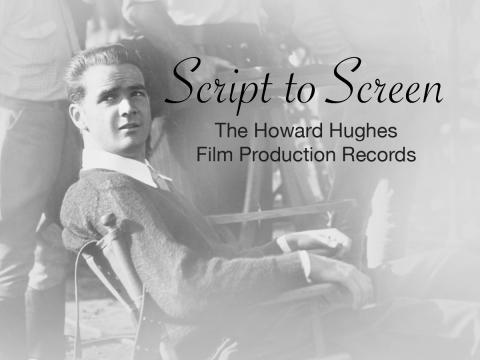
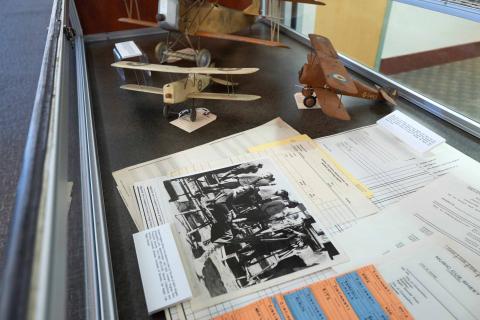
Miniature airplanes, photographs, and documents on display as part of the "Script to Screen" exhibit in Lied Library. 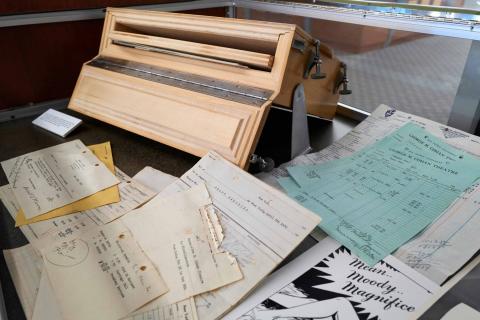
Bespoke wooden box on display as part of the "Script to Screen" exhibit in Lied Library. 
Miniature airplanes on display as part of the "Script to Screen" exhibit in Lied Library. 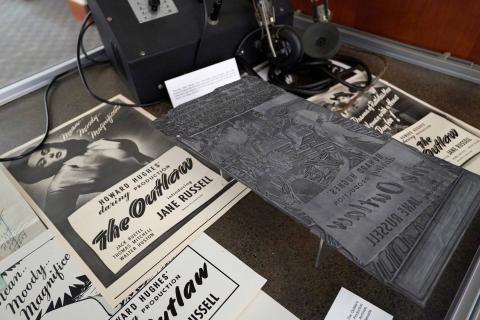
Advertisements for The Outlaw on display as part of the "Script to Screen" exhibit in Lied Library. 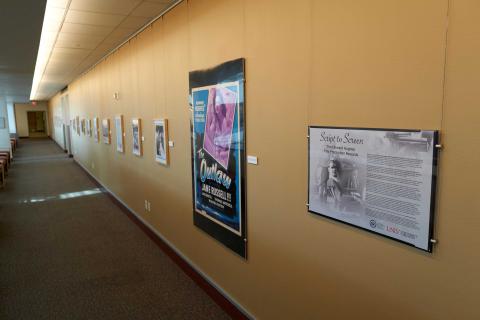
Gallery wall for the "Script to Screen" exhibit in Lied Library.
After two years of dedicated processing and detailed conservation, UNLV Special Collections and Archives is pleased to announce that the Howard Hughes Film Production Records (MS-01036) are now available for public access! The collection contains just over 400 cubic feet (over 500 boxes!) of materials from Howard Hughes’ film production companies. The materials document Hughes’ almost 40 years in Hollywood, as well as the foundation and dissolution of several of his well-known corporate entities. "Inventing Hollywood: Preserving and Providing Access to the Papers of Renegade Genius Howard Hughes" was a two-year processing project made possible through a generous grant from the National Endowment for the Humanities (NEH) and in collaboration with the UNLV Film Department. Howard Hughes’ impact on Hollywood can be felt through his timeless films such as Scarface (1932), Hell’s Angels (1930), The Outlaw (1943), and The Conqueror (1956) and materials related to the film production, sale, and distribution of these films comprise a significant portion of this collection.
The majority of the materials in the Howard Hughes Film Production Records (MS-01036) highlight the process by which Hughes’ various film production companies produced their films -- all the way from story concept to screen. The records also show how Hughes’ developed as a filmmaker from his arrival in Hollywood in 1925. Exposed to the industry through his uncle, the twenty-one year old Hughes immediately took an interest in film. The Caddo Company, formed in 1926, marked Hughes’ first attempt at a production company and successfully produced nine films, including Scarface and Hell’s Angels. Materials originating from The Caddo Company are the most complete example in the collection of the film production and distribution processes and include unique photographs and a collection of miniature aircraft used for special effects. After leaving film production for eight years to pursue aeronautics, Hughes' name returned to the big screen under his latest company, Hughes Productions, which is known for producing the notorious film, The Outlaw, starring Jane Russell. Censorship issues delayed the release of the film for many years, and Hughes combatted the pushback in a number of ways. Included within this collection are Russell Birdwell’s advertising campaign materials for the film, as well as material related to how in the end, Hughes utilized the censorship battle to sell the film. Also included are materials pertaining to the release of Hughes’ films under the California Pictures alongside Preston Sturges, as well as films under his leadership of RKO Radio Pictures.
Aside from film production records, the collection also highlights some of Hughes’ corporate endeavors and demonstrates the intricacies of business management in the mid-20th century. The numerous acquisitions, dissolutions, and legal battles that his many corporations underwent is staggering, but well documented in these records. Some of the business records show the struggle to turn a profit, and the rise of Nadine Henley, Noah Dietrich, and Neil S. McCarthy as crucial advisors to Hughes. In addition to film production records, materials also include documents, letters, and blueprints from a lesser known company, Multicolor, Limited, that attempted to compete against the film development powerhouse, Technicolor. The collection concludes with records from Hughes’ overarching corporate body Hughes Tool Company, which ranges from 1912 to 1990 including documents from Summa Corporation researching film rights.
Additionally, UNLV Special Collections and Archives has curated an exhibit titled Script to Screen: The Howard Hughes Film Production Records on the third floor of Lied Library that showcases examples of materials held in the collection. Ranging from photo stills taken on famous movie sets, to Hughes’ script annotations, to advertisements, the items demonstrate the broad range of materials, and potential research avenues for the collection. The full finding aid is available on the UNLV Special Collections and Archives Portal.
"Inventing Hollywood: Preserving and Providing Access to the Papers of Renegade Genius Howard Hughes" is a joint project sponsored by the UNLV Libraries Special Collections and Archives and the UNLV Department of Film, and is funded by a generous grant from the National Endowment for the Humanities.
About the National Endowment for the Humanities
Created in 1965 as an independent federal agency, the National Endowment for the Humanities supports research and learning in history, literature, philosophy, and other areas of the humanities by funding selected, peer-reviewed proposals from around the nation. Additional information about the National Endowment for the Humanities and its grant programs is available at: www.neh.gov.


